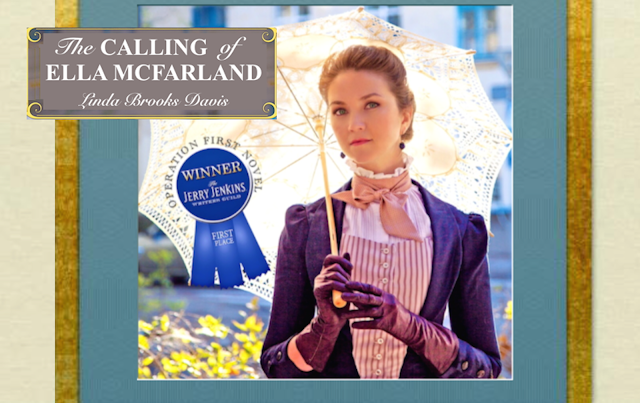The calling of Ella McFarland
Linda Brooks Davis is a writer of romantic historical fiction that inspires. Entered under the title GREATER STILL, THE CALLING OF ELLA MCFARLAND won 2014 Operation First Novel contest, sponsored by 21-times NY TIMES best-selling author Jerry B. Jenkins Christian Writers Guild. We have conducted an interview with her.
The Calling of Ella McFarland is a historical romance. Why did you choose the early XXth Century for your story?
Sitting on my grandmother’s lap and hearing her tales about life in Indian Territory prior to 1900 and in the early years of the twentieth century prior to Oklahoma statehood is among my earliest memories. I was fascinated. My mother continued the tradition through her passion for her family’s history in the early decades of the twentieth century in Texas. Someone in the family often would say “Someone ought to write a book about that” when referring to family lore. So it came naturally to return to my family legacy for the basis of THE CALLING OF ELLA MCFARLAND.
How you collect information and data for the historical aspect of your novel?
My mother's and grandmother's stories conveyed important historical realities. The internet provided a treasure trove of information, particularly the Oklahoma Historical Society. I also interviewed individuals with first-hand knowledge of the times, a surgeon who helped me with medical accuracy, and a victim of an accident like one described in the story. I made a trip to central Oklahoma and researched the locale and times in a library.
In which way do you think Ella’s story is an inspiration for women today?
The expression "war on women" is bandied about in America, but I find the phrase wholly inaccurate and misleading when women are running for President of the United States. In 1905 women were denied even the right to vote. They were silenced in public and often stifled at home. Until they were granted the vote in 1920, their rights were abridged in many ways, but compared to how women are treated in other parts of the world today, 1905 America was a stroll through a garden. Ella McFarland helped ordinary women find their voices and use them in extraordinary ways. She stands out as an example of fierce determination to make a difference through faith and grit, a worthy model for women today.
Most of the reviews emphasize your great skill in developing appealing characters. What is your advice to other authors for polishing their writing skill?
A plot fueled simply by a character's choices appeals to my head only. But a story that delves into the deep recesses of a player's heart and soul touches me. Love gives a story breath. But faith gives it a soul. To achieve accuracy of characterization, I consulted the Myers-Briggs Personality Inventory and tried to keep characters' actions & reactions true to their personality traits, keeping in mind the life-altering effect of faith.
Polishing writing skills is never ending. As a debut novelist, I have only embarked on that journey. I have learned, however, to look for certain personal writing tendencies when I'm self-editing. I read other writers everyday and try to stay attuned to what makes their writing powerful. I refer and re-refer to books on writing, such as James Scott Bell's PLOT AND STRUCTURE and K.M. Weiland's ANNOTATED JANE EYRE. I closely follow experts such as Jerry B. Jenkins, whose tips--like "Your Ultimate Reading List"--are gifts. Of course, THE CHICAGO MANUAL OF STYLE is a must for a serious writer.
The CALLING OF ELLA MCFARLAND is your debut novel. But as Jerry B. Jenkins, NY Times best-selling author, wrote, “It wont be her last”. What are your plans? When can we expect your next book to be published?
Currently I am working on another novel in a series of at least three, each happening in a different decade of the 20th Century. Each will center on characters readers get to know in THE CALLING OF ELLA MCFARLAND but because characters that seem real to readers are as different as human beings, each story will be different, as will each main character's motivations, goals, and obstacles. Subsequent stories will move readers beyond Oklahoma into widely contrasting circumstances. But each story will focus on faith's role in shaping and motivating individuals.




